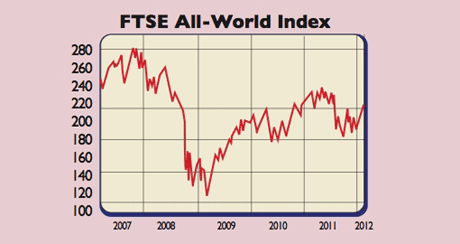Get the latest financial news, insights and expert analysis from our award-winning MoneyWeek team, to help you understand what really matters when it comes to your finances.
You are now subscribed
Your newsletter sign-up was successful
Want to add more newsletters?

Twice daily
MoneyWeek
Get the latest financial news, insights and expert analysis from our award-winning MoneyWeek team, to help you understand what really matters when it comes to your finances.

Four times a week
Look After My Bills
Sign up to our free money-saving newsletter, filled with the latest news and expert advice to help you find the best tips and deals for managing your bills. Start saving today!
"It is almost as if the past year has just been a bad dream," says Richard Milne in the FT. Global stocks, as measured by the FTSE All-World Index, have officially re-entered a bull market, climbing by more than 20% from their latest low last autumn.
America's Dow Jones Index has hit a four-year high and a new post-crisis peak. European stocks have reached a six-month high.
One reason for the new-found optimism is the improving tone of American data, which has fuelled hopes of a growth boost. Optimism on China has also increased: China's central bank has just allowed banks to boost lending in an attempt to underpin growth.
MoneyWeek
Subscribe to MoneyWeek today and get your first six magazine issues absolutely FREE

Sign up to Money Morning
Don't miss the latest investment and personal finances news, market analysis, plus money-saving tips with our free twice-daily newsletter
Don't miss the latest investment and personal finances news, market analysis, plus money-saving tips with our free twice-daily newsletter
But the main reason the feel-good factor has returned is the European Central Bank's (ECB) Long-Term Refinancing Operation (LTRO), whereby it lends out unlimited sums of money for three years at a very low interest rate.
This has eased the credit strains in the interbank market and encouraged banks to buy peripheral debt in order to profit from the difference in interest rates, thus easing the cost of funding for debt-squeezed states.
The upshot is that the ECB "has demonstrated its commitment to quantitative easing", says HSBC's Gary Evans. The ECB's help for the banking system has greatly reduced the likelihood of a Lehman's-style shock in Europe. The crisis has moved "from an acute to a chronic phase", as The Economist puts it.

Economic recovery is fragile
Yet the rally looks overdone. The big picture is that "for the world's richest nations, a post-recession recovery has never looked so sickly", says Phillip Inman in The Guardian. Only US growth was positive in the fourth quarter of 2011; elsewhere, economies shrank.
Investors have also forgotten that in America deep spending cuts are scheduled to kick in next January, which will undermine economic momentum, says Bank of America Merrill Lynch. With politicians unlikely to be able to agree to avert or rescind many of the cuts, this could amount to "a significant shock".
In Europe, austerity and recession reigns, while the latest figures show that banks aren't using the LTRO money to lend out: they are plugging holes in their balance sheets and deleveraging. Private sector deleveraging in the developed world still has a long way to go and oil prices are on the rise.
In China, the risks of a hard landing caused by the end of the investment boom or problems in the property sector "remain high", says Capital Economics. All this "amounts to a fragile recovery, which will remain particularly vulnerable to shocks". The latest American earnings season reflects the weak global momentum.
A wave of liquidity
The rally, then, is not based on fundamentals, but is "simply a big, fatbounce entirely consistent with a market being force-fed cheap money". Interest rates are at historically rock-bottom levels and the West's major central banks are currently either printing money or planning to.
Big expansions in central banks' balance sheets have coincided with surges in equity prices in recent years, says John Authers in the FT. "Once created, [money] tends to find its way to wherever it will make the greatest return."
Europe will stay cheap
This is highly unlikely to be the start of a long-term bull market. "Any sustainable rally" will be thwarted as long as banks remain undercapitalised and sovereign debt has not been restructured, says Lombard Odier's Strategy Bulletin.
When that happens, European markets "will be a superb and longer-term buying opportunity". For, unlike the US, European markets are "incredibly cheap", with the cyclically adjusted price/earnings ratio in Spain, France and Germany 35% to 57% below the long-term average.
The best bet now may be to opt for some of Europe's defensive, globally orientated dividend-payers. That way investors can secure some downside protection and get paid while Europe with a bit of luck muddles through its crisis.
Get the latest financial news, insights and expert analysis from our award-winning MoneyWeek team, to help you understand what really matters when it comes to your finances.
MoneyWeek is written by a team of experienced and award-winning journalists, plus expert columnists. As well as daily digital news and features, MoneyWeek also publishes a weekly magazine, covering investing and personal finance. From share tips, pensions, gold to practical investment tips - we provide a round-up to help you make money and keep it.
-
 Should you buy an active ETF?
Should you buy an active ETF?ETFs are often mischaracterised as passive products, but they can be a convenient way to add active management to your portfolio
-
 Power up your pension before 5 April – easy ways to save before the tax year end
Power up your pension before 5 April – easy ways to save before the tax year endWith the end of the tax year looming, pension savers currently have a window to review and maximise what’s going into their retirement funds – we look at how

